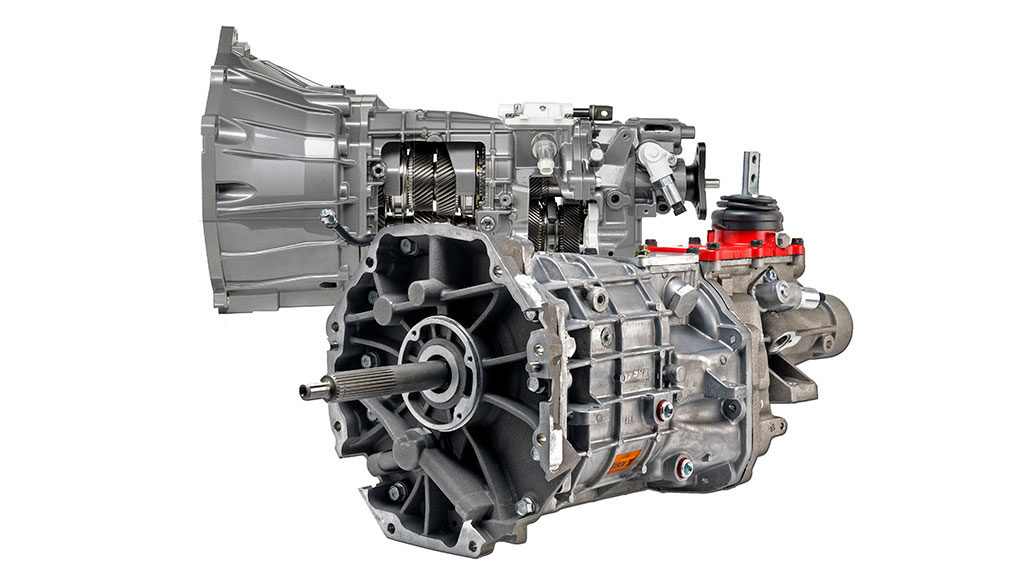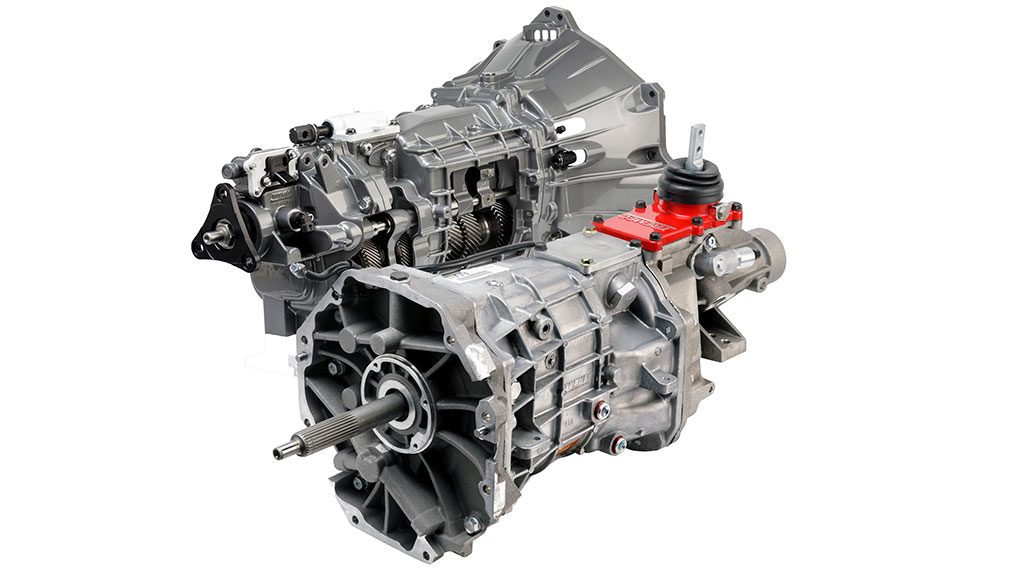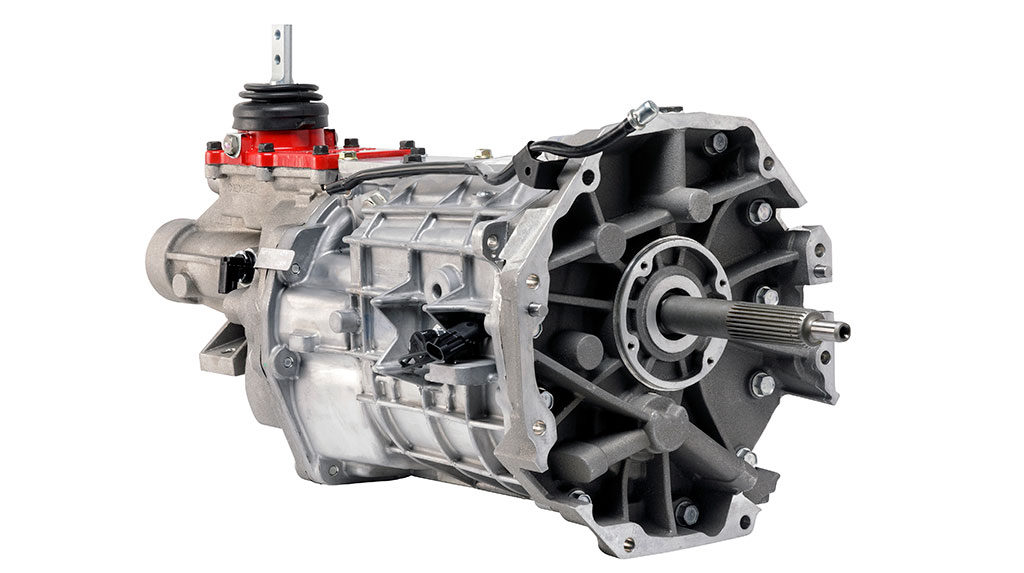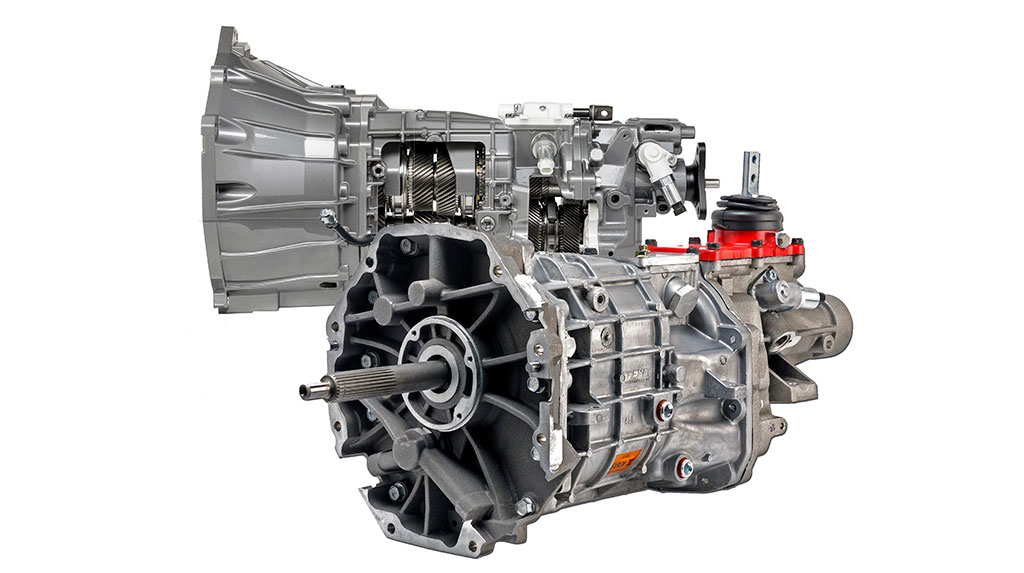People often confuse the original-equipment TREMEC TR-6060 6-speed manual transmission in performance models of the Chevrolet Camaro and Dodge Challenger with its aftermarket sibling, the TREMEC Magnum. While both have six forward gears and one reverse gear, there are many features that differentiate the two transmissions.
The Bellhousing

Most TREMEC TR-6060 transmissions use an integrated bellhousing. This means that the transmission side of the bellhousing also acts as the front of the transmission case.
This integral unit is vehicle specific (and/or engine-family specific) to accommodate a variety of factors, including engine-block flange bolt pattern, flywheel and clutch diameter, placement of the hydraulic-clutch connections and starter placement. Due to being so specific, it is less than ideal for retrofitting into other applications.
On the other hand, the TREMEC Magnum 6-speed was developed to attach to the engine-side bolt patterns on a variety of applications. It uses a front- or mid-plate design that closes off the front of the transmission case and has the common T-56 bolt pattern so that different bellhousings can be used. This includes SFI-rated bellhousings that must meet racing standards, such as for drag racing.
Multiple Shift Locations

Another major difference between the TREMEC TR-6060 and TREMEC Magnum is the shifter-location provisions. The TREMEC TR-6060 has as single-shifter location, using a “semi-remote” shifter assembly that is mounted to both the transmission and vehicle body. This design makes it very application-specific.
However, the TREMEC Magnum case has provisions for locating the shifter in the three different positions based on seat locations and transmission-tunnel shapes and sizes.
The shifter on the TREMEC Magnum can also be reversed in each of these three mounting locations, which can move the shifter location an additional 3 inches forward or rearward. The most forward shifter location allows the Magnum to be used in applications where a factory bench seat is retained.
Gearing
The TREMEC TR-6060 gear ratios meet the specifications designated by the automaker. And the car maker’s choose those gear ratios for the optimal balance of drivability, fuel economy, engine power band, optional factory rear gear ratios and vehicle weight. That’s why a TREMEC TR-6060 found in an S197 Mustang won’t have the same gear ratios as a TREMEC TR-6060 in a 5th Gen Camaro.
To provide maximum flexibility for the aftermarket, the TREMEC Magnum 6-speed is available with both wide- and close-ratio gear sets, along with two different overdrive gear sets. You can see the specs on those gear sets here.
Speedometer Signals

The TR-6060 was designed for modern vehicles with myriad electronics, and it has no provisions for a mechanical speedometer output. Some versions do not even have an electronic output, as they rely on wheel speed sensors rather than a signal from the transmission output shaft to determine vehicle speed.
The TREMEC Magnum 6-speed has provisions for both mechanical and electronic speedometer connections, which allows for modern and vintage engines in older vehicles, as well as replacement modern wiring harnesses and electronic gauge clusters.
The mechanical hookup is the standard “pencil gear”-style setup that requires matching the speedometer gear to the rear-end ratio. The electronic speedometer output is a two-wire sinusoidal-type sensor that utilizes an O.E.-style connector. Parts for either setup to function properly are widely available from TREMEC distributors.
Crossmember/Transmission Mount

Since each TR-6060 is application-specific, there is a transmission crossmember mount designed for that particular make/model.
However, the TREMEC Magnum features a multi-fit transmission-mount setup on the tail-shaft housing that works with common GM and Ford transmission crossmembers.
Cost
This is a big difference between a TREMEC Magnum and TR-6060: cost. While you might be able to find a stellar deal on a used TR-6060 from a wrecked vehicle or car being parted out, it can cost $1,500-$3,000 for just the bare transmission. The price then adds up quickly when you add in the conversion parts necessary to install it, even if you’re using the factory modern engine in front of it. Plus, you’re spending all that money on a used transmission with no idea what kind of shape the internals are in and what kind of abuse it has seen.
Balance that against the cost of a brand-new TREMEC Magnum 6-speed with all-new components that can be installed behind pretty much any engine with the proper bellhousing. Check our TREMEC distributors for a package with the TREMEC Magnum that will include the necessary installation accessories, such as crossmember, bellhousing, shifter and other peripherals.
Editor’s Note: This article explains the key differences between the TREMEC Magnum and TR-6060 transmissions. You may also be interested in an earlier technical article that covers the difference between the T-56 and Magnum 6-speed transmission.

